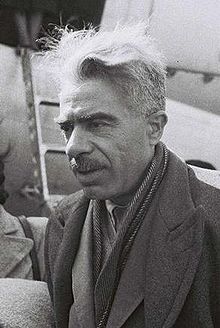- Meir Ya'ari
-
Meir Ya'ari 
Date of birth 21 February 1897 Place of birth Galicia Year of aliyah 1920 Date of death 24 April 1987 (aged 90) Knessets 1, 2, 3, 4, 5, 6, 7 Party Alignment (1969-1974) Former parties Mapam (1949-1969) Meir Ya'ari (Hebrew: מאיר יערי, 21 February 1897 – 24 April 1987) was an Israeli politician, educator and social activist. He was the leader of Hashomer Hatzair, Kibbutz Artzi and Mapam, and a member of the Knesset.
Contents
Life
Ya'ari was born in Galicia in 1897. At the break of World War I his family moved to Vienna. At the age of 17 he volunteered to the Austrian Army and served as an officer until the end of the war. He studied at the Agricultural Academy and at the University of Vienna. In 1919 he co-founded and co-led the Viennese Hashomer Hatzair. In 1920 he made aliyah to Israel. He worked at Kinneret and Gdud HaAvoda paving roads from Tiberias to Tzemah and to Tabgha. He was a prominent member in the first collective of Hashomer Hatzair in Bitania, and was among the founders of the Histadrut. Since 1924 he served as Secretary of the world Hashomer Hatzair.[1]
In 1927 he founded Kibbutz Artzi, was elected its secretary and took part in drafting its principles. In 1929 he was among the founders of kibbutz Merhavia, where he lived until he died.[1]
In 1948 he co-founded Mapam as its leader, and functioned as its general secretary until 1973. He was a Mapam MK in the first through seventh Knessets, from 1949 to 1973. In the first Knesset he was member of the Knesset committee, and in the fifth through seventh Knessets he was member of Foreign Affairs and Defense Committee.[1]
His movement co-leader and almost equal was Yaakov Hazan. For many years they led Hashomer Hatzair and Mapam together. Despite holding the top two positions in Mapam’s list, they made a joint decision not to become ministers but rather occupy themselves in the movement’s ideological and educational activities.[1]
He died in 1987. His grandson, Yedidya Ya'ari, is a retired IDF General.
Views
As leader and ideologist of Hashomer Hatzair, he sought to turn it from a scout-like youth movement promoting abstract socialist-humanist ideas to a political settlement movement that integrates Zionism and Marxism.
He protested David Ben-Gurion's activism and Mapai's moderate socialism. He regarded highly the achievements of Revolutionary Socialism in the Soviet Union, although he criticized its attitude towards Zionism. In the 1940s he opposed the Biltmore Program and supported the one-state solution.[1]
During Israel's early years, he objected his party’s coalition membership and was an outspoken critic of the government’s western orientation, the nationality conception, the Reparations Agreement and the martial law. At first, he supported the Soviet Union and tried, along with Moshe Sneh, to introduce Hashomer Hatzair’s idea in Mapam. The exposure of Stalin's wrongdoings caused a schism in the Marxist orientation, resulting in the expulsion of Moshe Snehs men from the party in 1953. Gradually, admiration of the Soviet Union lessened and inclination to cooperate with Mapai increased, and in 1955 Mapam indeed joined Mapai in the coalition. After the Six-Day War he expressed a relatively hawkish stand by opposing immediate withdrawal from the occupied territories. In 1969 he supported Mapam's alliance with Mapai as part of the Alignment (In 1984, he would support staying in the Alignment until the formation of the national unity government in 1984).[1]
(Not only his grandson, but his son, Aviezer (Avik), was (also) an Israeli Army General.
References
External links
- Meir Ya'ari Knesset website
- The Birth of Hashomer Hatzair Jewish Gen
Categories:- 1897 births
- Polish Jews
- Members of the Assembly of Representatives (Mandate Palestine)
- Members of the Knesset
- Israeli communists
- 1987 deaths
- Mapam politicians
- Alignment (political party) politicians
Wikimedia Foundation. 2010.
